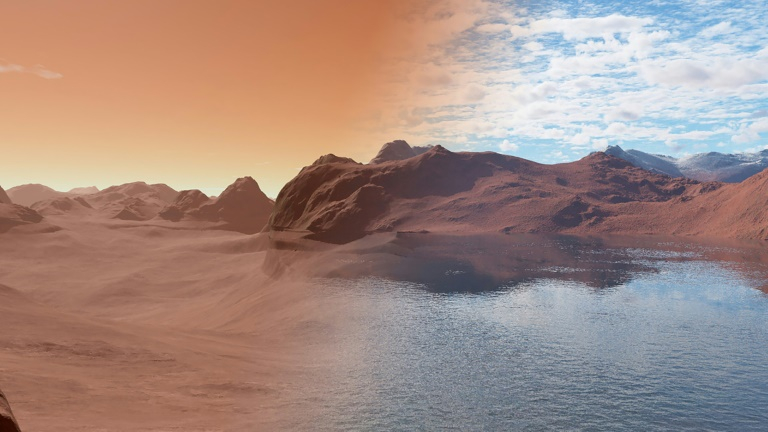Thirsty rocks may contain the missing water of Mars

An image comparing the current landscape of Mars, left, and how it may have looked when covered with lakes and oceans billions of years ago. Image: Jon Wade, James Moore – Nature Publishing Group/AFP
What happened to all the water that once sloshed in lakes and oceans on Mars? Much of it, researchers proposed Wednesday, may be locked up in stone.
Previous studies had concluded that the water was swept into space by powerful solar winds when the planet’s magnetic field collapsed, while some was captured in sub-surface ice.
But this did not account for all the missing water.
To try to track down the rest, an international team of researchers put scientific modelling to the test.
“The results revealed that the basalt rocks on Mars can hold approximately 25 percent more water than those on Earth, and as a result drew the water from the Martian surface into its interior,” said a statement from Oxford University, where scientists took part in the study.
As on Earth, chemical weathering and hydrothermal reactions can change minerals in rock from dry to water-bearing, study co-author Jon Wade of Oxford told AFP.
But Martian rock, because of a different composition, is much better at doing so.
Such rocks would have reacted with the surface water on Mars, locking some of it up in their mineral structure, Wade said in an email.
“It is not liquid anymore but physically bound in the mineral,” he said — which means the only way to release the water would be to melt the rock.
On an infant Earth, water-bearing rocks formed in a similar way would have floated on the planet’s super-hot surface until they melted, releasing water back to the surface as they did.
But on Mars, not all the rock would have melted and some of the water would have remained trapped in rock that sank straight to the mantle.
“In essence, Mars was doomed by its geochemistry!” Wade said.
Liquid water is a prerequisite for life as we know it. And although it is dry and dusty today, the Earth’s neighbor is thought to have been a wet planet once.
In 2015, NASA said almost half of Mars’s northern hemisphere had once been an ocean, reaching depths greater than 1.6 kilometers (one mile).
Later that year, a study announced the discovery of “water” remaining on the fourth rock from the Sun, in the form of super-salty brine streaks running down steep slopes.
The latest findings were published in the journal Nature. AB
RELATED STORIES:
Super big black hole from early universe farthest ever found
Interstellar asteroid given Hawaiian nickname ‘Oumuamua’